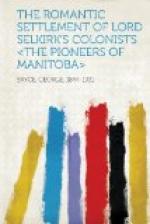Everybody makes for himself what he wishes in this undifferentiated Settlement. We return in tatters. Not a tailor, nor anything approaching the description of one, exists here, and a week’s search is needed to discover such a being as a shoemaker. A single store in the Hudson’s Bay post at each of the two forts, twenty miles apart, supplies the goods of the outside world, and the purchaser must furnish the receptacle for carriage. For small goods this invariably consists, as far as we can see, of a red bandanna handkerchief, so that purchases have to be small and frequent; not all of one sort, however, for the native can readily tie up his tea in one corner, his sugar and buttons in two others, and still have one left for normal uses. How many handkerchiefs a day are put to use may be judged from the fact that the average sale of tea at Upper Fort Garry is four large boxes daily—all, be it remembered, brought by ship to Hudson Bay, and thence by batteaux and portage to the Red River.
The caravan by which we and a number of others were carried back to civilization was a stylish enough turnout for Red River. It was supplied by McKinney, the host of the Royal Hotel of the village of Winnipeg. Three large emigrant wagons, with canvas coverings of the most approved pattern, but of very different hues, drawn each by a yoke of oxen, convey the patrons of the party, with the exception of a miner, who rides his horse. The astronomers take the lead under a brown canvas; a theological student for Toronto University, a gentleman for St. Paul, and others follow under a black canvas full of holes; and the third wagon with a cover of spotless purity, conveys the ladies of the party and a clergyman. Behind them follow not only half a dozen Red River carts, with a most promiscuous assortment of baggage, peltry, and squeak, but also a stray ox and a pony or two; a number of armed horsemen, and for the first day a cavalcade of friends giving a Scotch convoy to those who were departing. The astronomers at length reached St. Paul, when they declare their connection with the world again complete, after an absence of about three months, during which they had travelled thirty-five hundred miles.
CHAPTER XXIII.
Apples of gold.
Shakespeare’s play of “As You Like It” is an eulogy of the flight from the highly formal life of city life to the simplicity of the forest and the retirement of the plains. Even in the banished Duke, there is a strain of oddity and quaintness. Not many years after the middle of last century, a Detroit lawyer fled from the troubles of society and city life to the peaceful plains of secluded Assiniboia. Marrying, after his arrival, a daughter of one of our best native families, and on her death, a pure Indian woman, he reared a large family. The poetic spirit of Frank Larned was never repressed, and we give, with some changes, to suit our purpose, and at times some divergence from the views expressed, scenes of the Red River Settlement, in which he, for more than a generation, dwelt.




